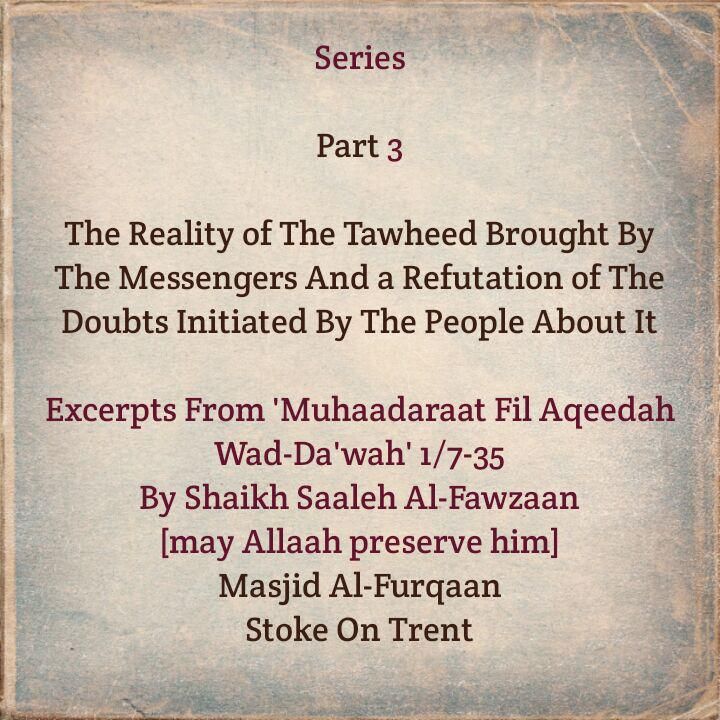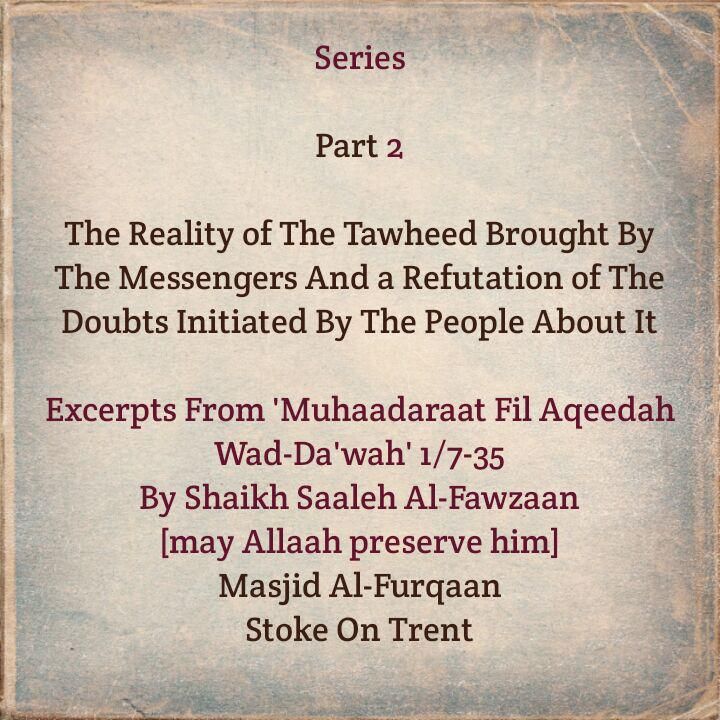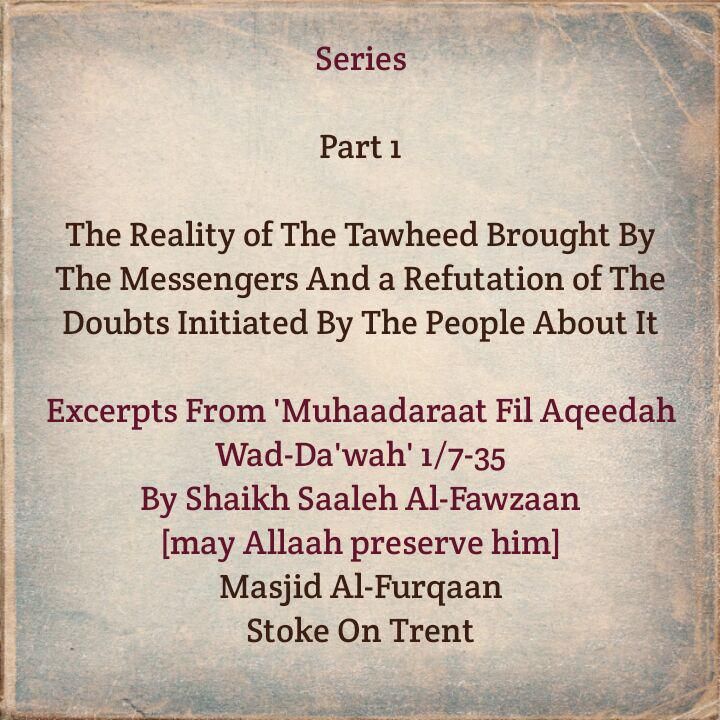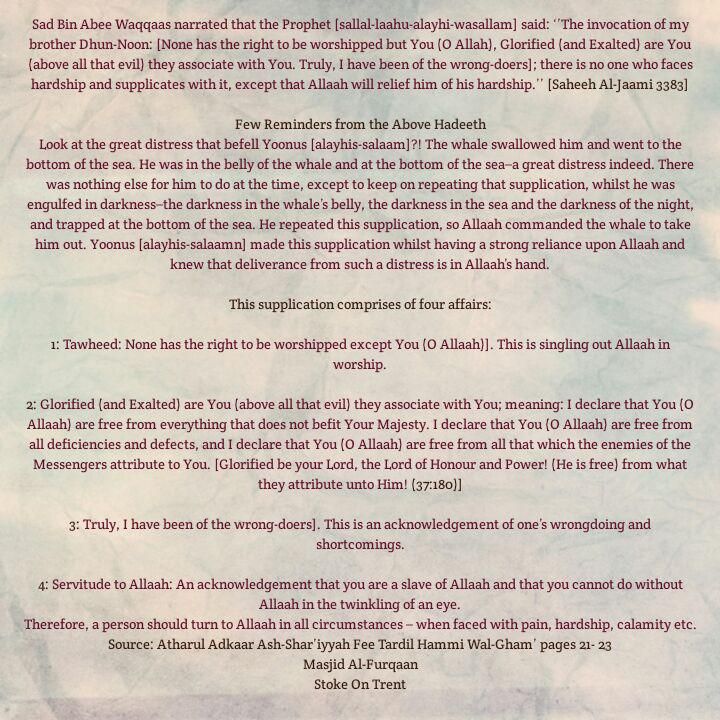In The Name of Allaah, The Most Merciful, The Bestower of Mercy


Indeed, remembrance of Allaah and drawing close to Him through righteous deeds and statements cannot be accepted by Allaah unless the worshipper fulfils them based on three Pillars, and they are: Love, fear and hope.These three pillars are the pillars of servitude of the heart and no act of worship is accepted except through them. Allaah [جلّ وعلا] is to be worshipped out of love of Him, hoping for His reward and fearing His punishment. Allaah [The Blessed and Most High] mentioned these pillars of worship in Surah Al-Faatihah which is the best Surah of the Qur’aan.
Love as a pillar of worship is found in statement [الْحَمْدُ لِلَّهِ رَبِّ الْعَالَمِينَ – All the praises and thanks be to Allah, the Lord of the ‘Alamin (mankind, jinns and all that exists)]. That is because Allaah is the Bestower of all favours (or blessings) and the Bestower of blessings (or favours) is loved in accordance with the favours (or blessings) He bestows, and [الْحَمْدُ] is to praise alongside having love for the one who is praised. Hope as a pillar of worship is found in the statement [الرَّحْمَٰنِ الرَّحِيمِ -The Most Beneficent, the Most Merciful]. That is because the believer hopes for Allaah’s Mercy and desires its attainment. Fear as a pillar of worship is found in the statement [مَالِكِ يَوْمِ الدِّين -The Only Owner (and the Only Ruling Judge) of the Day of Recompense (i.e. the Day of Resurrection)]. [يَوْمِ الدِّين – The Day of Recompense] is the day of reckoning.
Then the statement [إِيَّاكَ نَعۡبُدُ وَإِيَّاكَ نَسۡتَعِينُ – You (Alone) we worship, and You (Alone) we ask for help (for each and everything)] follows thereafter, which means: O our Lord! We worship You based on those aforementioned pillars- love, hope and fear. These are the three pillars upon which[إِيَّاكَ نَعۡبُدُ وَإِيَّاكَ نَسۡتَعِينُ is established. They have also been mentioned in Surah Al-Israa Ayah 57:
[أُوْلَـٰٓٮِٕكَ ٱلَّذِينَ يَدۡعُونَ يَبۡتَغُونَ إِلَىٰ رَبِّهِمُ ٱلۡوَسِيلَةَ أَيُّہُمۡ أَقۡرَبُ وَيَرۡجُونَ رَحۡمَتَهُ ۥ وَيَخَافُونَ عَذَابَهُ ۥۤۚ إِنَّ عَذَابَ -Those whom they call upon [like ‘Iesa (Jesus) – son of Maryam (Mary), ‘Uzair (Ezra), angel, etc.] desire (for themselves) means of access to their Lord (Allah), as to which of them should be the nearest and they [‘Iesa (Jesus), ‘Uzair (Ezra), angels, etc.] hope for His Mercy and fear His Torment].
In the above Ayah, the statement ”desire (for themselves) means of access to their Lord (Allah)” means seeking to get close to Allaah through love and doing what He loves. Then Allaah stated, ”(They) hope for His Mercy and fear His Torment”. Therefore in this Ayah, love, fear and hope are mentioned, and likewise stated in Surah Al-Anbiyaa:
إِنَّهُمۡ ڪَانُواْ يُسَـٰرِعُونَ فِى ٱلۡخَيۡرَٲتِ وَيَدۡعُونَنَا رَغَبً۬ا وَرَهَبً۬اۖ وَڪَانُواْ لَنَا خَـٰشِعِينَ
Verily, they used to hasten on to do good deeds, and they used to call on Us with hope and fear, and used to humble themselves before Us.
Therefore, a slave (i.e. the one who worships Allaah alone) must combine these three pillars [love, fear and hope] in his (or her) acts of worship and remembrance of Allaah. It is not permissible to worship Allaah with only one of them without the others, such as worshipping Allaah with love alone without fear and hope, or worshipping Allaah with hope alone, or worshipping Allaah with fear alone. And due to this, some of the scholars said, ”Whoever worships Allaah with love alone is a Zindeeq (i.e. such as the extreme soofees etc); and whoever worships Allaah with fear alone is a Harooree (i.e. from the Khaarij), and whoever worships Allaah with hope alone is a Murji, and whoever worships Allaah with love, fear and hope is a believer and person of Tawheed. [End-Ref 1]


We should know that fear of Allah should be combined with love and hope, so that fear does not become a cause of giving up hope in Allaah’s Mercy. A believer should have both fear of Allaah and hope in Allaah’s Mercy, so that fear alone does not lead him to give up hope in Allaah’s mercy, nor will hope alone make feel secure from Allaah’s plan. That is because giving up hope in Allaah’s Mercy and feeling secure from Allaah’s plan are two affairs that negate perfect Tawheed. Allaah [The Most High] said:
فَلَا يَأۡمَنُ مَڪۡرَ ٱللَّهِ إِلَّا ٱلۡقَوۡمُ ٱلۡخَـٰسِرُونَ
None feels secure from the Plan of Allah except the people who are the losers. [7:99]
And Allaah [The Most High] said:
إِنَّهُ ۥ لَا يَاْيۡـَٔسُ مِن رَّوۡحِ ٱللَّهِ إِلَّا ٱلۡقَوۡمُ ٱلۡكَـٰفِرُونَ
Certainly no one despairs of Allah’s Mercy, except the people who disbelieve.” [12:87]
And Allaah said:
وَمَن يَقۡنَطُ مِن رَّحۡمَةِ رَبِّهِۦۤ إِلَّا ٱلضَّآلُّونَ
“And who despairs of the Mercy of his Lord except those who are astray. [15:56]
Ismaa’eel Ibn Raafi (rahimahullaah) said, ”Feeling secure from Allaah’s plan is when the slave is persistent in committing sin, whilst hoping for Allaah’s forgiveness’’.
The Scholars (rahimahumullaah) say, ”Despair is to distance oneself from having hope for relief and losing hope in that, and it is the opposite of feeling secure from Allaah’s plan. Both these two affairs are a great sin. It is neither permissible for a believer to adhere to fear alone, and thus despairs of Allaah’s Mercy, nor should he adhere to hope alone, and thus feels secure from Allaah’s punishment; rather he should have fear and hope – fearful due to his sins, performs acts of obedience to Allaah and hopes for Allaah’s Mercy, just as Allaah [The Most High] stated:
إِنَّهُمۡ ڪَانُواْ يُسَـٰرِعُونَ فِى ٱلۡخَيۡرَٲتِ وَيَدۡعُونَنَا رَغَبً۬ا وَرَهَبً۬اۖ وَڪَانُواْ لَنَا خَـٰشِعِينَ
Verily, they used to hasten on to do good deeds, and they used to call on Us with hope and fear, and used to humble themselves before Us. [21:90]
And Allaah said:
أُوْلَـٰٓٮِٕكَ ٱلَّذِينَ يَدۡعُونَ يَبۡتَغُونَ إِلَىٰ رَبِّهِمُ ٱلۡوَسِيلَةَ أَيُّہُمۡ أَقۡرَبُ وَيَرۡجُونَ رَحۡمَتَهُ ۥ وَيَخَافُونَ عَذَابَهُ ۥۤۚ إِنَّ عَذَابَ رَبِّكَ كَانَ مَحۡذُورً۬ا
Those whom they call upon [like ‘Iesa (Jesus) – son of Maryam (Mary), ‘Uzair (Ezra), angel, etc.] desire (for themselves) means of access to their Lord (Allah), as to which of them should be the nearest and they [‘Iesa (Jesus), ‘Uzair (Ezra), angels, etc.] hope for His Mercy and fear His Torment. Verily, the Torment of your Lord is something to be afraid of! [17:57]
When fear of Allaah and hope in Allaah are combined, it urges a slave (i.e. a worshipper of Allaah) to perform deeds and utilise the beneficial means to that; for indeed alongside having hope in Allaah’s Mercy, he performs acts of obedience and hopes for reward; and by way of fear, he abandons disobedience due to being fearful of Allaah’s punishment. But if he despairs of Allaah’s Mercy, he may stop performing righteous deeds, and if he feels secure from Allaah’s punishment, he is pushed towards acts of disobedience. [Ref 2]
[Ref 1: Abridged & paraphrased. Source: Fiqhul Ad’iyah Wal-Adkaar’ page 99-100′ parts 1&2′ by Shaikh Abdur-Razzaaq al-Badr (may Allaah preserve him)
[Ref 2: Abridged & paraphrased. Source: ‘Al-Irshaad Ilaa Saheeh Al-I’tiqaad War-Raddu Alaa Ahlish-Shirki Wal-Ilhaad’ pages 85 onwards’ by Shaikh Saaleh Al-Fawzaan (may Allaah preserve him). Publisher: Daarul Aa’simah’ 1st ed (Year 1423AH- year 2002]









